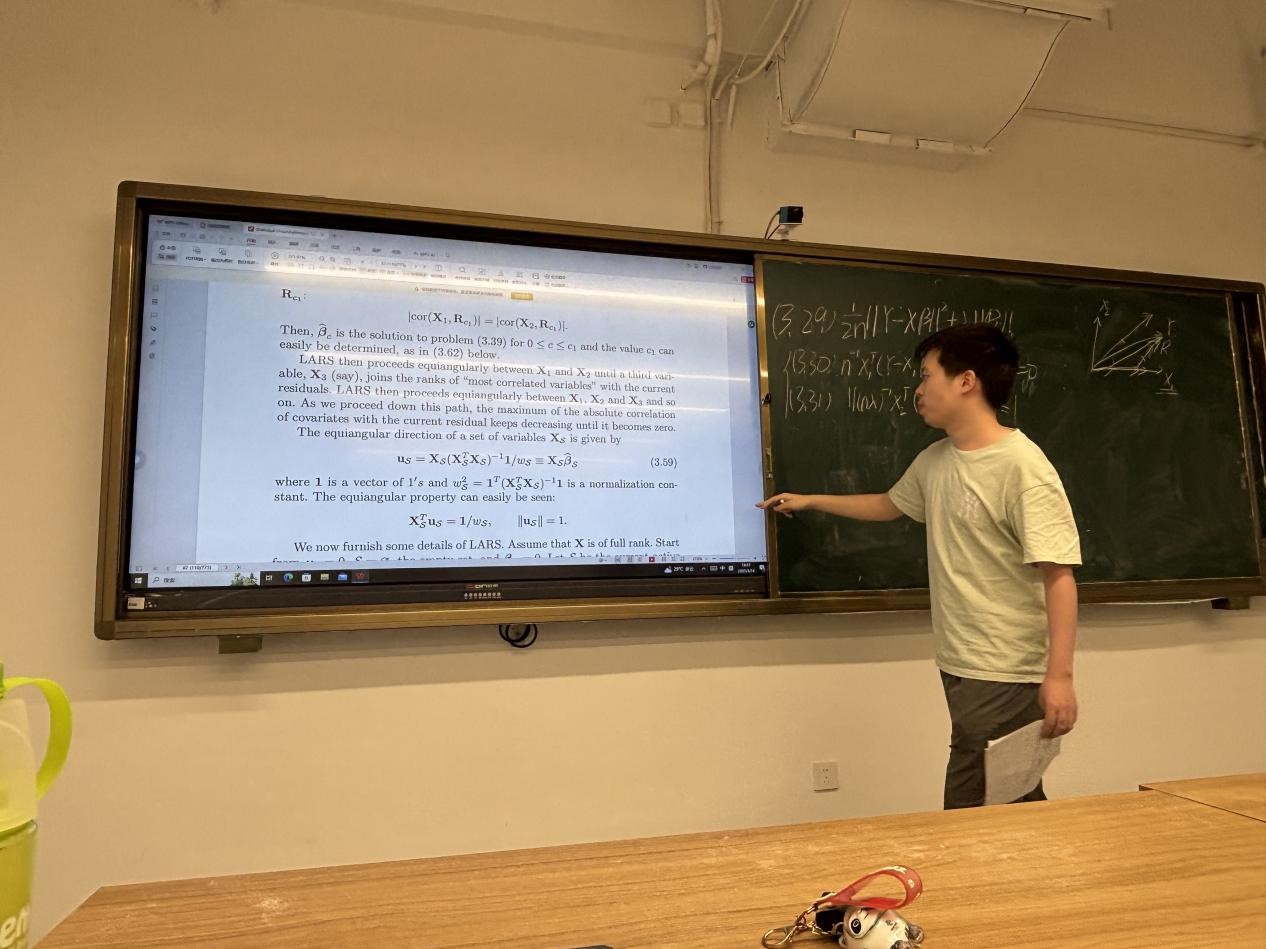To further enhance undergraduates’ research literacy, broaden their academic horizons, and strengthen their theoretical foundation, the School of Mathematics and Statistics has innovatively launched this semester’s “Undergraduate Research Seminar” series of academic activities. Professors Deng Shirong and Xu Xiaofei jointly chaired the seminar on statistics, focusing closely on statistical inference methods for high-dimensional and ultra–high-dimensional data in the era of big data. The seminar covered cutting-edge advances in statistics and its interdisciplinary fields, fully demonstrating the school’s exploration and practice in cultivating top-tier innovative talent.

Throughout the semester, the Statistics Research Seminar held five thematic academic sessions. Following the “student presenter — full participation” format, each session featured one student as the main speaker, while other faculty and students actively engaged in questioning, exchange, and critical discussion, achieving integrated knowledge growth and collective development. Faculty and students jointly studied classic monographs and frontier research papers from home and abroad, creating a rich academic atmosphere.
The first seminar, centered on the frontiers of statistics, began with Professor Deng Shirong’s discussion of longitudinal data analysis using real hospital patient data. He offered an in-depth explanation of the practical significance of longitudinal data modeling and statistical inference, helping students gain an intuitive understanding of such methods and their applications. Professor Xu Xiaofei then systematically expanded on time series analysis theory, providing a clear and structured explanation of complex and diverse time series models based on the students’ existing knowledge, thereby greatly enhancing their research capabilities and academic perspective.
The second seminar, titled “An Introduction to the Statistical Foundations of Data Science,” was presented by Liu Ziyang, an undergraduate in the 2022 cohort of Financial Mathematics. Liu comprehensively reviewed the background of the emergence of high-dimensional and ultra–high-dimensional statistical methods and explored in depth how data dimensionality affects data characteristics, computational efficiency, noise accumulation, and spurious correlations. He emphasized the theoretical and practical challenges high-dimensional statistics face in big-data environments.
The third seminar focused on multivariate and nonparametric regression methods. Zou Wenxiu, an undergraduate in the 2022 Data Science and Big Data Technology program, systematically introduced topics including theoretical foundations, modeling needs, regularization mechanisms, and model evaluation methods. Her presentation covered the support provided by the Gauss–Markov theorem for optimal linear unbiased estimation, basis expansion strategies for polynomial and spline regression, the mathematical principles of the L2 penalty term in ridge regression, and evaluation methods such as cross-validation, thereby helping students build a solid theoretical foundation.
The fourth seminar centered on high-dimensional variable selection and penalized least squares methods. Li Yuxi, an undergraduate from the 2022 Information and Computational Science program, systematically reviewed classical variable selection algorithms such as best subset selection and stepwise regression, along with their computational complexity. She focused especially on the theoretical advantages of penalty terms like the L0 norm in terms of model sparsity, unbiasedness, and continuity, and elaborated, with reference to thresholding theory, on the excellent performance of folded concave penalty methods under orthogonal designs.
The fifth seminar delved into the Lasso method and its derivative variable selection techniques, as well as the practical applications of Bayesian methods in high-dimensional variable selection. Fang Zhiqi, an undergraduate in the 2022 Statistics program, provided a detailed comparison of the performance and applicability of Lasso, adaptive Lasso, elastic net, Dantzig selector, and Bayesian approaches, showcasing the richness and forefront of high-dimensional variable selection methods in statistics. The two supervising professors further supplemented the discussion by introducing important modern statistical research directions and trending applications, with particular attention to the theoretical innovations of adaptive Lasso, effectively inspiring students’ research enthusiasm and creative thinking.

This semester’s Statistical Research Seminar was well-structured, thematically focused, and content-rich, effectively promoting the deep integration of theory and methodology while reinforcing the core statistical idea that “model selection requires balancing complexity and interpretability.” The activity not only significantly enhanced students’ academic competence but also laid a solid foundation for their future work in high-dimensional data analysis and statistical method innovation. The School of Mathematics and Statistics will continue to uphold its philosophy of “education first, innovation driven,” and actively advance the systematic and professional development of undergraduate research training, contributing solid strength to the cultivation of high-quality, innovative statistical talent.